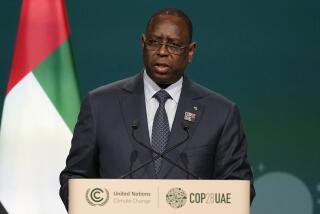Iraqi prime minister backs ban on 500 election candidates
- Share via
Reporting from Baghdad — Prime Minister Nouri Maliki threw his support Saturday behind a decision to ban about 500 candidates from participating in Iraq’s upcoming elections despite an outcry from the mostly Sunni and secular parties that are affected.
The decision by the Accountability and Justice Commission to bar the candidates has revived Sunni-Shiite sectarian tensions, called into question the Iraqi government’s commitment to reconciliation and cast doubt over the likely inclusiveness of elections that U.S. officials are hoping will stabilize Iraq.
Maliki said in a statement that the commission’s rulings must be respected “without exception” and cautioned against “the politicization” of a process intended to weed out former supporters of the outlawed Baath Party, which ruled Iraq under Saddam Hussein.
But opponents of the ban charge that the process is politicized because the Accountability and Justice Commission is headed by two men who are leading candidates with the main Shiite coalition.
The commission’s chairman, Ahmad Chalabi, and its executive director, Ali Lami, are on the Iraqi National Alliance slate, the Shiite bloc of mostly religious parties that is aiming to win enough seats to claim the prime minister’s job.
The two men were on the De-Baathification Commission set up by former U.S. Administrator L. Paul Bremer III, and they kept their jobs when the commission was renamed because efforts to form a new one failed in parliament.
“This is totally a political decision,” said Maysoon Damluji, a legislator with the secular coalition led by former Prime Minister Iyad Allawi, which is believed to have had “many” candidates disqualified. “This is one way to get rid of your political opponents, by de-Baathifying them,” she said.
Lami defended the ban, saying the Constitution prohibits Baathists from public office.
“We have very firm evidence that raises no doubts that these candidates were Baathists,” he said, adding that commission rules prevent him from releasing the evidence.
Maliki’s support of the disqualifications offers the clearest indication yet that they will be upheld, despite intense pressure from the United Nations to reach a compromise allowing Sunnis who have joined the political process to participate. Those barred can appeal to a panel of judges, but there are concerns that it won’t have time to examine 500 cases in time for the March 7 elections.
The 500 names have not yet been officially published, but officials have confirmed that they include the prominent Sunni politician Saleh Mutlak, who heads one of the biggest Sunni blocs in the parliament, and the Sunni defense minister in Maliki’s coalition, Abdul-Qader Obaidi, who was on the list of candidates for Maliki’s State of Law coalition.
Rumors about who was on the list overshadowed the Saturday launch of the Iraqiya alliance, a broad coalition of Sunni and secular parties led by Allawi that aims to crack the dominance of the Shiite religious parties in government.
Standing with Allawi on the podium of the ballroom at Baghdad’s Rashid Hotel was Mutlak as well as the current Sunni vice president, Tariq Hashemi, the deputy prime minister, Rafi Issawi, and numerous lesser-known leaders of smaller factions that identify themselves as Iraqi nationalists.
Despite threats of an election boycott by some Sunni leaders, most of those at the Iraqiya inauguration expressed little inclination to repeat the experience of the January 2005 vote, when a Sunni boycott handed power to Shiites and eventually helped propel the country’s descent into sectarian warfare.
“This is what they want us to do. They want the nationalists to boycott so that they win all the power,” said Rabia Yaseen Saoud, a supporter of the coalition. “But our goal is to win the next election.”
There were widespread concerns, however, that the ban will dissuade many Sunnis from voting, causing disillusionment with a political process that has failed to demonstrate inclusiveness.
Times staff writers Usama Redha and Caesar Ahmed contributed to this report.
More to Read
Sign up for Essential California
The most important California stories and recommendations in your inbox every morning.
You may occasionally receive promotional content from the Los Angeles Times.










